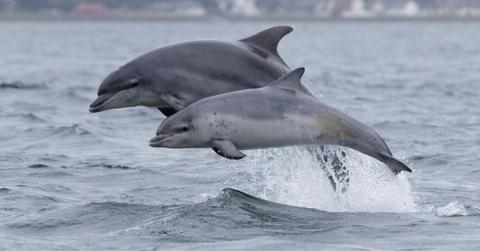Wild Dolphin Interactions With Humans Prohibited in New Zealand's Bay of Islands
The goal is to restore the bottlenose dolphin population.
Updated Aug. 28 2019, 12:39 p.m. ET

Boat tours in the Bay of Islands, New Zealand are known for allowing tourists to swim in the water with wild bottlenose dolphins. But due to the species' dwindling population, the country's Department of Conservation has banned the activity, which will significantly limit human interaction with the vulnerable dolphins. This action is a great example of a government prioritizing wildlife conservation over profit, even though the new regulation could negatively impact New Zealand's economy.
As reported by The Telegraph, officials made the decision to prohibit humans swimming with the dolphins based on a New Zealand Department of Conservation (DOC) study. The study noted that in 1999, in the Bay of Islands area, which is located north of Auckland, the bottlenose dolphin population was about 270. Now, it's just 31, meaning it's decreased by nearly 90 percent over the past two decades, according to the NZ Herald. Additionally, there has been a 75 percent mortality rate among bottlenose dolphin calves in the region, which is the highest mortality rate in New Zealand — both in the country's waters and in captivity, according to The Guardian.
As the DOC elaborates on its website, the bottlenose dolphin population decreases by 7.5 percent every year, and almost half of all bottlenose calves die before they reach 1 year old. A common cause of bottlenose dolphin mortality is getting hit by boat propellers when boats get too close to dolphins or speed through dolphin pods. The DOC also noted that these incidents happen most frequently in the summer (which is from December through March, in the southern hemisphere), which also happens to be the dolphins' birthing season.
In addition to ending human interactions with the dolphins, the government is putting a limit on how long tour boats can swim alongside the dolphins. Boat tour operators will now only be allowed to interact with the dolphins for 20 minutes, down from 30 minutes.
Basically, the DOC study concluded that tourist interactions are "having a significant impact on the population’s resting and feeding behaviour," according to The Guardian. DOC authorities also noted that the relationship between the bottlenose dolphins and humans has become "too close and unhealthy," as per The Telegraph.
Even though the news just became publicized this week, Bay of Islands-based tour group Explore Group's website says: "As of the 1st July 2019, due to Department of Conservation regulations, swimming with bottlenose dolphins is not permitted in the Bay of Islands." Even without the dolphin interactions, the tour still offers dolphin-watching, commentary about marine mammal conservation efforts, and snorkeling in the Bay of Islands.
Over the past few years, various stories of marine mammal mothers carrying around their dead calves have gone viral. One such incident happened in the Bay of Islands earlier this year, in late January, when a mother bottlenose dolphin was spotted carrying her deceased baby on her back. In response to this tragic sighting, the DOC recommended that all humans avoid dolphin groups in the Bay of Islands.
It's awesome that now, in addition to simply recommending that humans leave the dolphins be, the DOC government has created concrete regulations limiting human's negative impact on the Bay of Islands' bottlenose dolphin population. Hopefully, for the sake of protecting these creatures, stricter regulations are still to come.